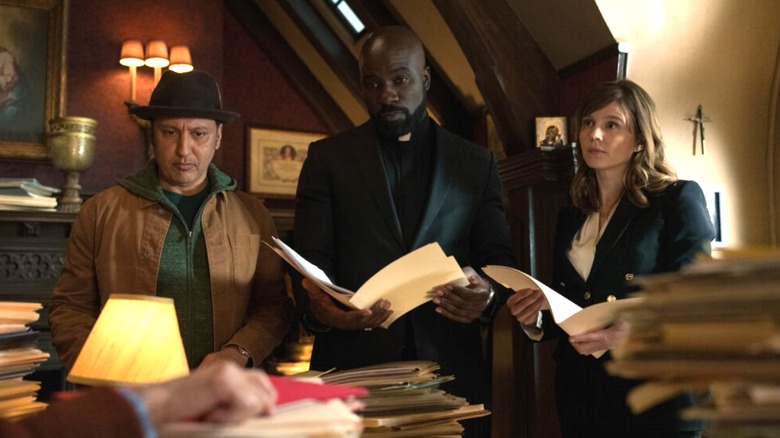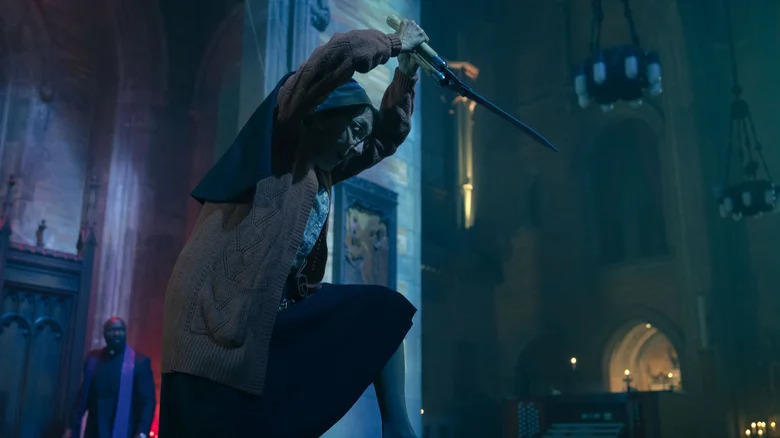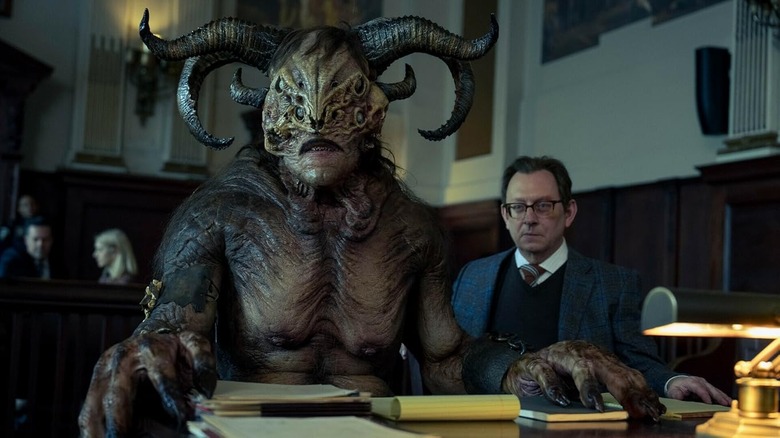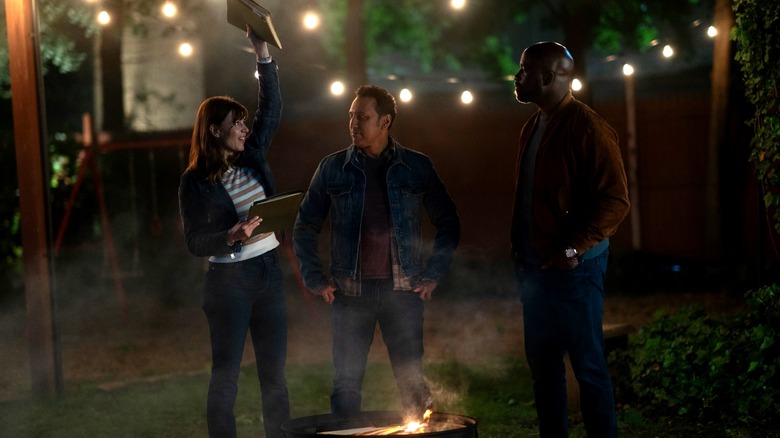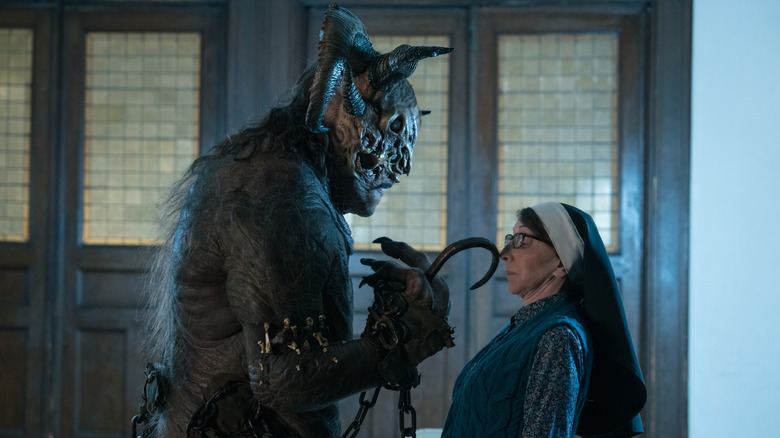Evil Ending Explained: The Best Horror Show On TV Ends, And Some Lingering Questions Remain
This post contains spoilers for "Evil."
The age of streaming is full of problems. TV shows are getting extremely expensive, seasons are getting too short while the wait between them becomes too long, and shows are getting canceled before they have a chance to hit their groove. Even when shows are successful according to every metric, they can get canceled just for reasons that have nothing to do with their quality, like corporate cost-cutting.
Such is the case with "Evil," the best horror TV show since "Hannibal" and "The Exorcist." It's a series that mixes network procedurals with all-time great tales of the macabre, giving audiences monster-of-the-week stories that not only feature some of the best creature work on TV, but also tell poignant stories about the hell of modern existence and how the devil can't compare to the evil of the internet and late-stage capitalism. For four seasons, "Evil" echoed a time where TV episodes were allowed to be weird and good on their own without being forced to focus on building up to a binge watch experience. But now the show has sadly come to an end (despite the show itself joking in one of its final episodes about how the ratings were good, critical consensus was good, and there really was no reason for this cancelation). Like everything "Evil," there are a lot of questions left unanswered and plenty of answers open to interpretation. Let's take one final look at "Evil" and what its ending means.
The road to Evil
"Evil" follows three assessors working for the Catholic Church investigating possible supernatural events, like an evil elevator that supposedly takes you to hell, or a viral TikTok that causes people to uncontrollably burst into song before doing self harm, or a whole bunch of people who think they are possessed for various reasons. Meanwhile, there's the overarching story of a war between agents from the Vatican and a sect of people using politics and technology to bring evil to New York City. This fight entered a new stage at the end of season 3 when Kristen (Katja Herbers) found out a missing egg she had been looking for all season long was fertilized with the child of her mortal enemy, Leland (Michael Emerson), who is trying to raise the child as the Antichrist.
The fourth and final season primarily dealt with Father David working with the Vatican CIA (aka The Entity, aka the Friends of the Vatican) using remote viewing for different assignments, and Leland's attempts to sabotage and hypnotize Kristen's husband Andy (Patrick Brammall) into killing one of his kids. This comes to a boil when Kristen's mother Sheryl (Christine Lahti) finally switches sides and betrays Leland, getting the baby Antichrist baptized so he is useless to the demons, and also tries to kill Leland and take down his entire organization. Sadly, this fails and she gets thrown out of a four-story window by Leland and his demons, killing her.
Sheryl's parting gift to Kristen is a bunch of incriminating evidence against Leland that finally gets him arrested, while the baby Antichrist is put in Kristen's care since she's the biological mother.
The Kings were able to give the story a proper ending
Creators Robert and Michelle King were at least allowed to finish "Evil" with an additional four episodes in its final season. These ramped up the overarching story as it primarily dealt with the fallout of Leland's arrest and subsequent trial. Still, because this is "Evil," of course we did not get a "proper" serialized story for the final arc, but rather we continued getting side stories that provided interesting commentary on the horrors of the modern world — all while still advancing the overarching narrative. There was one about a Stephen Hawking-type scientist being a creep and also maybe being possessed (with plenty of comments about the character being on Epstein's island), and the show even took on the concept of evil doppelgangers.
As for the biggest developments, the final four episodes had Andy escape rehab with a fellow patient who tells Kristen she is one of her daughters time-traveling from the future, and who also tries to kill the baby Antichrist because she was under the influence of Leland. Speaking of, Leland's trial goes sideways (of course) when his literal demon lawyer convinces the judge to sell his soul and decapitate the star witness, which sets Leland free. Oh, and the assessor program is shut down when the church is sold off to an Amazon stand-in for no reason.
Evil defeated ... kind of
In the finale, the assessors start getting used to life beyond their assessing work. Ben (Aasif Mandvi) gets a rather high-paying IT job, Kristen opens her own practice, and David (Mike Colter) is about to move to Rome.
The finale plays with the idea of the future, this time via another spooky and incredibly advanced VR app that supposedly shows you things that have not yet come to pass. Kristen's kids, and later Kristen, Ben, and David, use it and all of them are transported to a virtual reality so immersive that Mark Zuckerberg is kicking himself for not acquiring it. They all witness horrifying visions of the future: The kids see Leland kill Kristen, Ben sees the death of his sister, David sees a demon attack him, and Kristen sees the cops take away her daughters.
Meanwhile, Leland tricks the Entity into thinking the 60 families are gathering in the deconsecrated grounds of the church and lures them into a trap to kill a bunch of Vatican agents, while in reality, the 60 gather online. The company he works for announces the launch of a brand new VR app (the one the girls use earlier in the episode), which will bring evil directly into consumers' brains rather than rely on physical temptation. Evil lives on and takes a new form, as the demons wait for the next Antichrist.
As for Leland, he tries to kill Kristen himself, but is instead captured by our trio, who lock him in the demon cabinet from the "S is for Silence" episode. The show ends with a flash forward, as David and Kristen are working as assessors for the church in Rome, and we get a glimpse of baby Timothy having a cute little demonic face.
Evil leaves some questions unanswered
Like most things "Evil," the finale leaves a lot of questions unanswered and unaddressed, and much like with the controversial ending of "Lost," your mileage may vary and depend on where your priorities lie with this show. If you wanted "Evil" to become a fully serialized show about a priest, an agnostic, and a non-believer literally battling 60 heads of demonic families, then yes, this finale was a bit of a disappointment. If you wanted the finale to neatly tie up its mysteries (or address them at all), well, it doesn't. This starts with Timothy now suddenly becoming a demon again despite his baptism, and even Ben's jinn seems to be gone without an explanation.
But isn't that what "Evil" has always been about? Much like "The X-Files," this has always been a show full of big reveals that are immediately ignored and forgotten by the characters, who never really talk about what happens to them. How did Ben get rid of his jinn? Who cares, but he does. Isn't keeping Leland locked in a cabinet illegal and basically murder? Sure, but who asked you?
Instead, the finale is an encapsulation of what makes "Evil" one of the best shows on TV. It is mostly a standalone episode about young girls playing with an app that seems haunted, the team investigates and realizes the app is tracking your information and literally mapping out your house, and then we get some serialized bits with Leland and the demons. Does it wrap things up perfectly as a finale? No, but that's never the kind of show "Evil" was.
Evil wraps up in an appropriate way
Nowhere is this more evident than in the resolution to the Leland and the 60 families storyline. Sure, Leland is defeated, which is the best we could hope for since he was the face of evil throughout the show. But the 60 families are not just at large, they are evolving and launching a new app that will make things worse for absolutely everyone.
And that's the theme of "Evil," and its ultimate message. You can defeat the psychopath who's relentlessly going after your family, but you can't fight evil as a concept, because it's everywhere and it just takes a new form. For four seasons, this show has explored the mundanity of evil in the modern world, and how things like algorithms, corporations, and institutions feel scarier and more evil than any demon in the bible. To end the show with the representatives of Satan on Earth changing tactics to instead wreak havoc via an online app that directly inflicts evil on the brain via unexplained sci-fi chips in VR headsets is perfect.
Then there's the final scene of David, Kristen, and the girls in Rome. Now that David is technically working full-time as an assessor for the Vatican rather than as a priest, the finale seems to hint that he could just quit the priesthood, still work for the church, and be together with Kristen — just as fake future Laura predicted, and as audiences have asked for since the show began. We may never get more "Evil," but at least we got glimpses at where these characters could be headed thanks to the maybe-not-entirely-fake future predictions from future Laura.
